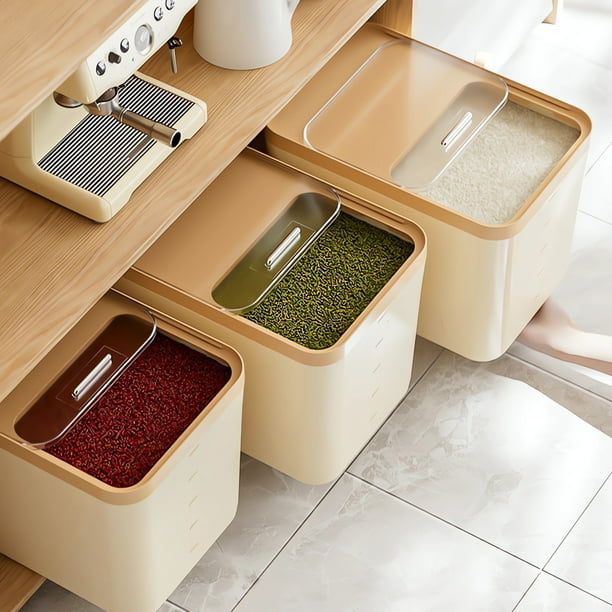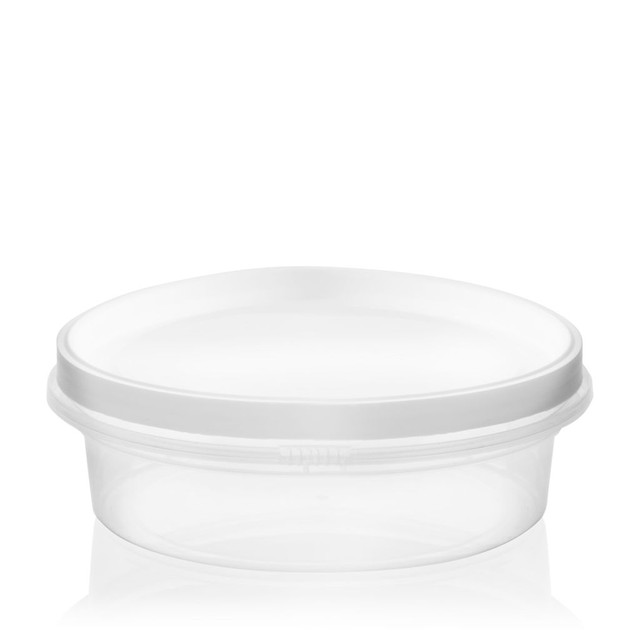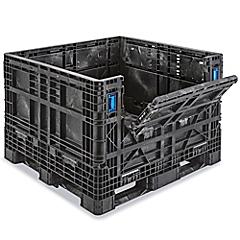A Comprehensive Overview to the Various Sorts Of Bulk Plastic Containers Available Today
Bulk plastic containers play a vital function in different industries, using solutions for storage space and transport. Their diverse types provide to various demands, from inflexible alternatives for solid products to versatile containers fitting different shapes. Each kind provides unique advantages, making it vital to recognize their applications and features. As markets progress, so do the needs for reliable container remedies. What aspects should one take into consideration when selecting the ideal bulk container?
Review of Mass Plastic Containers

Kinds Of Mass Plastic Containers
Bulk plastic containers can be found in numerous forms, each matched to certain applications. Inflexible mass containers, adaptable mass containers, and intermediate mass containers represent the main categories, each offering unique advantages. Understanding these kinds is essential for choosing the appropriate container for transferring and keeping materials.

Rigid Bulk Containers
Rigid bulk containers are essential for reliable storage and transportation of numerous products throughout industries. These containers are typically constructed from resilient plastics, allowing them to withstand rough handling and environmental problems. They are available in numerous shapes and dimensions, consisting of totes, drums, and bins, making them ideal for storing every little thing from granular compounds to fluids. Stiff containers often feature enhanced walls and safe and secure lids, making certain the materials continue to be protected throughout transit. Their stackable style takes full advantage of storage room, making them suitable for storage facilities and making centers. In addition, many rigid mass containers are recyclable and recyclable, adding to sustainability efforts. In general, their robustness and convenience make inflexible bulk containers a vital element in supply chain procedures.
Adaptable Mass Containers
Flexible mass containers, often described as adaptable intermediate bulk containers (FIBCs), function as a functional solution for keeping a range and delivering of dry materials. These containers are usually made from woven polypropylene and are designed to be lightweight yet strong, enabling reliable handling and piling. Their versatility enables them to accommodate different sizes and shapes, making them appropriate for items ranging from grains to chemicals. FIBCs can be furnished with features such as spouts for easy dental filling and discharge, along with protective finishes for boosted resilience. Additionally, they are multiple-use and recyclable, adding to lasting techniques in industries such as farming, food processing, and building. Generally, versatile mass containers supply a economical and effective alternative for bulk material monitoring.
Intermediate Bulk Containers
Intermediate bulk containers (IBCs) are necessary for the efficient transport and storage space of liquids and granular materials throughout numerous sectors. These containers generally have an ability varying from 275 to 330 gallons and are developed for very easy dealing with and piling. Made from sturdy materials like high-density polyethylene or steel, IBCs give superb security against contamination and ecological variables. Their style consists of features such as an integrated pallet for forklift access and a detachable top for simple filling and cleaning. IBCs are commonly made use of in chemical, food, and pharmaceutical fields, making sure compliance with security regulations. Their flexibility and reusability make them a cost-efficient option for mass storage space and transportation, adding to provide chain efficiency and sustainability.
Attributes and Benefits of Mass Plastic Containers
Mass plastic containers are important tools in various industries, using a combination of sturdiness and practicality. These containers are created from premium materials, making them immune to impacts, chemicals, and environmental factors. This robustness warranties product safety throughout storage space and transport.
Furthermore, bulk plastic containers are lightweight, assisting in convenience of handling and lowering delivery costs. Their stackable layout makes the most of storage space effectiveness, permitting optimized storage facility space. Lots of versions include safe lids or closures, providing an impermeable seal that avoids and protects materials contamination.
Bulk plastic containers are usually recyclable and recyclable, contributing to lasting practices. Their convenience enables a large range of applications, from food storage to commercial usage, boosting their value throughout fields. Companies take advantage of the lengthy life expectancy and low maintenance requirements of these containers, making them a cost-effective remedy for both long-lasting and temporary needs.
Industries That Make Use Of Bulk Plastic Containers
Numerous markets take advantage of making use of mass plastic containers, each leveraging their special residential properties for certain applications. The food and beverage industry depends on these containers for secure storage space and transport of products, while the chemical production industry uses them for handling unsafe materials. browse around this web-site Furthermore, the pharmaceutical distribution needs stress the relevance of toughness and sanitation in product packaging remedies.
Food and Beverage Sector
As the demand for safe and efficient storage solutions proceeds to increase, the food and beverage industry significantly depends on mass plastic containers for their functional needs. These containers provide durable, light-weight, and versatile options for storing active ingredients, completed products, and waste products. Made from food-grade materials, they ensure compliance with health and wellness standards. Different layouts, such as stackable containers and lug boxes, optimize space throughout transport and storage, improving logistical performance. Additionally, the transparency of some mass containers enables easy stock management, minimizing the danger of perishing. With the sector's concentrate on sustainability, numerous manufacturers are currently providing multiple-use and recyclable choices, lining up with eco-friendly methods while meeting the high needs of food safety and hygiene.
Chemical Manufacturing Industry
The chemical manufacturing field relies heavily on bulk plastic containers for the efficient and risk-free storage space of resources, intermediates, and finished items. These containers are designed to withstand different chemicals, making sure that harmful products do not leakage or weaken the container itself. Common types include high-density polyethylene (HDPE) and polypropylene containers, which supply exceptional chemical resistance and durability. Their lightweight nature and stackable layout help with transportation and storage space, enhancing space in making centers. Furthermore, several mass plastic containers come with functions such as tamper-evident seals and easy-to-read labeling, enhancing safety and security and conformity with market regulations. On the whole, mass plastic containers are indispensable to the chemical production procedure, providing trustworthy options for managing varied substances.
Pharmaceutical Distribution Demands
Pharmaceutical circulation relies upon mass plastic containers to satisfy rigid safety and security and regulatory demands. These containers are vital for transferring and keeping a selection of pharmaceutical products, including active pharmaceutical components (APIs) and completed medications. Their style guarantees protection versus light, contamination, and dampness, maintaining the integrity of delicate products. Additionally, mass plastic containers are compliant with industry criteria such as Good Manufacturing Practices (GMP) and are usually made from products that are FDA-approved. Using these containers enhances performance in the supply chain, permitting risk-free, large distribution while reducing waste. Firms in the pharmaceutical sector focus on making use of durable, watertight, and tamper-evident containers to assure item security and top quality throughout the logistics procedure.
Factors to consider for Selecting the Right Container
When picking the proper bulk plastic container, various elements should be meticulously considered to guarantee suitable functionality and safety. The nature of the products to be kept is vital; compatibility with the container's product can influence integrity and safety and security. plastic bulk containers. In addition, the container's dimension and form have to straighten with the storage and transport requirements, assuring reliable room use
Tons ability is another essential consideration, as it ought to suit the weight of components without risk of damages or failing. The design functions, such as airing vent or lids, can impact usability and accessibility. Compliance with market laws is essential, specifically in fields like drugs, where safety criteria are rigorous.
The anticipated i thought about this life-span and durability of the container ought to be evaluated to confirm it satisfies the functional needs without frequent replacement. By reviewing these aspects, one can choose one of the most ideal bulk plastic container for details applications.
Environmental Influence and Sustainability
As companies significantly focus on sustainability, the environmental influence of bulk plastic containers has come under scrutiny. These containers, usually made from materials such as polyethylene or polypropylene, contribute greatly to plastic waste if not managed effectively. Their production entails the usage of fossil gas, which can lead to raised greenhouse gas exhausts. However, innovations in recycling innovation and the advancement of biodegradable alternatives are helping to reduce these issues.
Additionally, lots of makers are taking on methods that emphasize the usage of recycled materials, therefore decreasing the demand for virgin plastics. The toughness of bulk plastic containers likewise plays a role; they are developed to be recycled several times, which can lessen their overall environmental impact when compared to single-use choices. Eventually, the industry encounters the challenge of balancing capability with eco-friendly duty, making lasting methods necessary for the future of mass plastic containers.
Finest Practices for Storage and Transport
Reliable storage and transport of mass plastic containers considerably influence both operational efficiency and sustainability. To optimize area, organizations must stack containers safely, guaranteeing security and protecting against damage. Correct labeling is essential for simple recognition, which simplifies access processes. In addition, maintaining a organized and tidy storage location lowers the threat of contamination and enhances safety.
For transport, choosing the right vehicle is crucial; containers must be safeguarded to stay clear of shifting throughout transit. Companies need to additionally think about utilizing pallets to help with easier loading and unloading. Normal examinations of containers for wear and tear can protect against costly substitutes.
Temperature level control is another vital aspect, as extreme conditions can compromise the stability of the plastic. Training personnel on finest practices for taking care of and transport guarantees conformity and promotes a society of security. By executing these best practices, organizations can enhance their functional performance while adding to environmental sustainability.
Frequently Asked Questions
Exactly how Do I Tidy Mass Plastic Containers Successfully?
To tidy mass plastic containers properly, one ought to wash them with warm water, use a light detergent and scrub with a soft brush. Rinse extensively, after that permit to air dry totally before storage or reuse.
What Is the Lifespan of Mass Plastic Containers?
The life expectancy of bulk plastic containers normally varies from 5 to 10 years, relying on the product, usage, and environmental conditions. Appropriate upkeep and storage space can greatly visit this web-site prolong their functionality and toughness in time.
Can Mass Plastic Containers Be Customized?

Do Mass Plastic Containers Have Guarantee Options?

Are There Rules for Making Use Of Mass Plastic Containers?
Yes, laws exist for utilizing bulk plastic containers, largely concentrated on safety and security, environmental effect, and product compliance. These guidelines guarantee that containers satisfy market standards and are appropriate for carrying numerous substances safely and efficiently.
Inflexible bulk containers, adaptable mass containers, and intermediate mass containers stand for the key classifications, each offering distinct advantages. Adaptable mass containers, typically referred to as versatile intermediate bulk containers (FIBCs), serve as a flexible solution for storing a selection and moving of completely dry materials. The chemical manufacturing field depends heavily on bulk plastic containers for the efficient and secure storage space of raw materials, intermediates, and completed products. Bulk Plastic Containers. These containers are designed to stand up to various chemicals, making certain that hazardous materials do not leak or weaken the container itself. Additionally, bulk plastic containers are certified with market standards such as Excellent Manufacturing Practices (GMP) and are frequently made from products that are FDA-approved